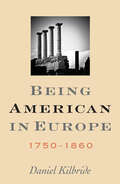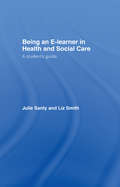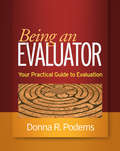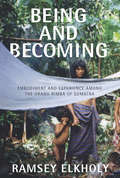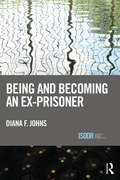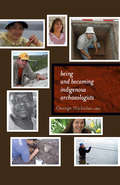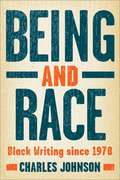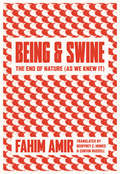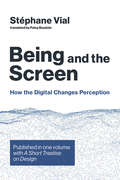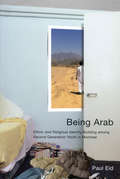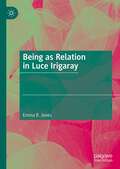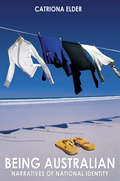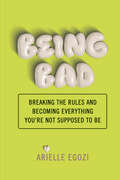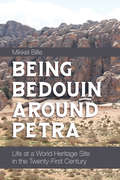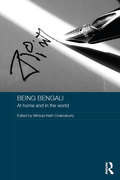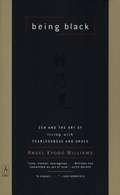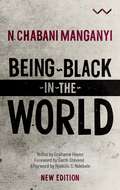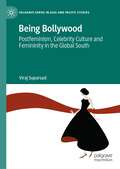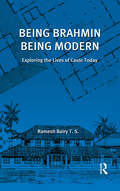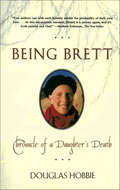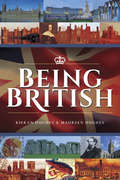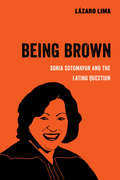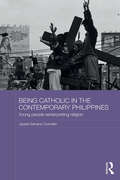- Table View
- List View
Being American in Europe, 1750–1860
by Daniel KilbrideWhen eighteenth- and nineteenth-century Americans made their Grand Tour of Europe, what did they learn about themselves?While visiting Europe In 1844, Harry McCall of Philadelphia wrote to his cousin back home of his disappointment. He didn’t mind Paris, but he preferred the company of Americans to Parisians. Furthermore, he vowed to be "an American, heart and soul" wherever he traveled, but "particularly in England." Why was he in Europe if he found it so distasteful? After all, travel in the eighteenth and early nineteenth centuries was expensive, time consuming, and frequently uncomfortable. Being American in Europe, 1750–1860 tracks the adventures of American travelers while exploring large questions about how these experiences affected national identity. Daniel Kilbride searched the diaries, letters, published accounts, and guidebooks written between the late colonial period and the Civil War. His sources are written by people who, while prominent in their own time, are largely obscure today, making this account fresh and unusual.Exposure to the Old World generated varied and contradictory concepts of American nationality. Travelers often had diverse perspectives because of their region of origin, race, gender, and class. Americans in Europe struggled with the tension between defining the United States as a distinct civilization and situating it within a wider world. Kilbride describes how these travelers defined themselves while they observed the politics, economy, morals, manners, and customs of Europeans. He locates an increasingly articulate and refined sense of simplicity and virtue among these visitors and a gradual disappearance of their feelings of awe and inferiority.
Being an E-learner in Health and Social Care: A Student's Guide
by Liz Smith Julie SantyE-learning is a new, exciting and increasingly popular way of learning for health and social care professionals, both in the pre- and post-qualification stages. However, many people are apprehensive about what it involves and whether they will be able to study effectively in this way. This book is designed to help students and their tutors to become acquainted with the issues and methods around being an online learner in health and social care. It gives practical advice and provides guidance on developing skills and attitudes for successful online learning within health and social care. Based on the authors’ experience of teaching online, the book includes numerous tips and case studies. Topics discussed include: skills and responsibilities for successful online learning the virtual learning environment and using online resources clinical, professional and communication skills online assessment and evaluation. Being an E-learner in Health and Social Care is essential reading for all students undertaking online courses or continuing professional development in nursing, public health, social work, social care and health psychology.
Being an Evaluator: Your Practical Guide to Evaluation
by Donna R. PodemsDemystifying the evaluation journey, this is the first evaluation mentoring book that addresses the choices, roles, and challenges that evaluators must navigate in the real world. Experienced evaluator and trainer Donna R. Podems covers both conceptual and technical aspects of practice in a friendly, conversational style. She focuses not just on how to do evaluations but how to think like an evaluator, fostering reflective, ethical, and culturally sensitive practice. Extensive case examples illustrate the process of conceptualizing and implementing an evaluation--clarifying interventions, identifying beneficiaries, gathering data, discussing results, valuing, and developing recommendations. The differences (and connections) between research, evaluation, and monitoring are explored. Handy icons identify instructive features including self-study exercises, group activities, clarifying questions, facilitation and negotiation techniques, insider tips, advice, and resources. Purchasers can access a companion website to download and print reproducible materials for some of the activities and games described in the book.
Being and Becoming: Embodiment and Experience among the Orang Rimba of Sumatra
by Ramsey ElkholyFor the Orang Rimba of Sumatra - and tropical foragers in general - life in the forest engenders a kind of "connectedness" that is contingent not only on harmonious relations between people, but also between people and the non-human environment, including those supernatural agencies of the forest that people depend on for their spiritual and emotional wellbeing. Exploring this world, anthropologist Ramsey Elkholy treats embodied action and perception as the basis of shared experience and shows how various forms of embodied experience constitute the very foundations of human culture. In a unique methodological contribution, Elkholy adopts a set of body-centered approaches that reflect and capture the day-to-day, moment-to-moment ways in which people engage with the world. Being and Becoming is an important contribution to phenomenological anthropology, hunter-gatherer studies, and to Southeast Asian ethnography more generally.
Being and Becoming an Ex-Prisoner (International Series on Desistance and Rehabilitation)
by Diana F. JohnsDespite broad scholarship documenting the compounding effects and self-reproducing character of incarceration, ways of conceptualising imprisonment and the post-prison experience have scarcely changed in over a century. Contemporary correctional thinking has congealed around notions of risk and management. This book aims to cast new light on men’s experience of release from prison. Drawing on research conducted in Australia, it speaks to the challenges facing people leaving prison and seeking acceptance amongst the non-imprisoned around the world. Johns reveals the complexity of the post-prison experience, which is frequently masked by constructions of risk that individualise responsibility for reoffending and reimprisonment. This book highlights the important role of community in ex-prisoner integration, in providing opportunities for participation and acceptance. Johns shows that the process of becoming an ‘ex’-prisoner is not simply one of individual choice or larger structural forces, but occurs in the spaces in between. Being and Becoming an Ex-Prisoner reveals the complex interplay between internal and external meanings and practices that causes men to feel neither locked up, nor wholly free. It will appeal to scholars and students interested in desistance, criminology, criminological or penological theory, sociology and qualitative research methods.
Being and Becoming Indigenous Archaeologists
by George P. NicholasWhat does being an archaeologist mean to Indigenous persons? How and why do some become archaeologists? What has led them down a path to what some in their communities have labeled a colonialist venture? What were are the challenges they have faced, and the motivations that have allowed them to succeed? How have they managed to balance traditional values and worldview with Western modes of inquiry? And how are their contributions broadening the scope of archaeology? Indigenous archaeologists have the often awkward role of trying to serves as spokespeople both for their home community and for the scientific community of archaeologists. This volume tells the stories—in their own words-- of 37 indigenous archaeologists from six continents, how they became archaeologists, and how their dual role affects their relationships with their community and their professional colleagues. Sponsored by the World Archaeological Congress
Being and Race: Black Writing Since 1970
by Charles JohnsonFor the first time in ebook, renowned scholar Charles Johnson's exploration of contemporary black literature and the meaning of the black experience as expressed through the writers Richard Wright, Jean Toomer, David Bradley, and others. Charles Johnson approaches contemporary black literature through the lens of phenomenology. Drawing on such philosophers as Heidegger, Husserl, Satre, and Dufrenne, Johnson addresses the esthetic and epistemological questions surrounding the black experience as expressed by African American authors. In exploring the works of Wright, Toomer, Bradley, and many more, Being & Race enlarges our vision of what fiction's purpose is and how it arises from our common experiences.
Being and Swine: The End of Nature (As We Knew It)
by Fahim AmirForget everything you think you know about nature. Fahim Amir’s award-winning book takes pure delight in posing unexpected questions: Are animals victims of human domination, or heroes of resistance? Is nature pristine and defenceless, or sentient and devious? Is being human really a prerequisite for being political? In a world where birds on Viagra punch above their weight and termites hijack the heating systems of major cities, animals can be recast as vigilantes, agitators, and public enemies in their own right. Under Amir’s magic spell, pigs transform from slaughterhouse innocents into rioting revolutionaries, pigeons from urban pests into unruly militants, honeybees from virtuous fuzzballs into shameless centrefold models for eco-capitalism. As paws, claws, talons, and hooves seize the means of production, Being and Swine spirals higher and higher into a heady thesis that becomes more convincing by the minute. At the heart of Amir’s writing is a deep optimism and bracingly fresh reading of Marxist, post-colonial, and feminist theory, building upon the radical scholarship of Donna J. Haraway and others. Contrarian, whip-smart, and wildly innovative, no other book will laugh at your convictions quite like this one.
Being and the Screen: How the Digital Changes Perception. Published in one volume with A Short Treatise on Design (Design Thinking, Design Theory)
by Stephane VialHow digital technology is profoundly renewing our sense of what is real and how we perceive.Digital technologies are not just tools; they are structures of perception. They determine the way in which the world appears to us. For nearly half a century, technology has provided us with perceptions coming from an unknown world. The digital beings that emerge from our screens and our interfaces disrupt the notion of what we experience as real, thereby leading us to relearn how to perceive. In Being and the Screen, Stéphane Vial provides a philosophical analysis of technology in general, and of digital technologies in particular, that relies on the observation of experience (phenomenology) and the history of technology (epistemology). He explains that technology is no longer separate from ourselves—if it ever was. Rather, we are as much a part of the machine as the machine is part of us. Vial argues that the so-called difference between the real and the virtual does not exist and never has. We are living in a hybrid environment—which is both digital and nondigital, online and offline. With this book, Vial endows philosophical meaning to what we experience daily in our digital age.In A Short Treatise on Design, Vial offers a concise introduction to the discipline of design—not a history book, but a book built of philosophical problems, developing a theory of the effect of design.This book is published with the support of the University of Nîmes, France.
Being Arab
by Paul EidEid looks at the significance of religion to ethnic identity building, a largely understudied issue in ethnic studies, and the extent to which social and cultural practices are structured along ethnic and religious lines. Being Arab also analyzes whether gendered traditions act as identity markers for young Canadians of Arab descent and whether men and women hold different views on traditional gender roles, especially regarding power within romantic relationships and sexuality.
Being Arab: Ethnic and Religious Identity Building among Second Generation Youth in Montreal (McGill-Queen's Studies in Ethnic History #110)
by Paul EidEid looks at the significance of religion to ethnic identity building, a largely understudied issue in ethnic studies, and the extent to which social and cultural practices are structured along ethnic and religious lines. Being Arab also analyzes whether gendered traditions act as identity markers for young Canadians of Arab descent and whether men and women hold different views on traditional gender roles, especially regarding power within romantic relationships and sexuality.
Being as Relation in Luce Irigaray
by Emma R. JonesMany scholars have struggled with Irigaray’s focus on sexuate difference, in particular with her claim that it is “ontological,” wondering if this implies a problematically naïve or essentialist account of sexuate difference. As a result, the ethical vision which Irigaray elaborates has not been taken up in a robust way in the fields of philosophy, feminism, or psychoanalysis.By tracing the notion of relation throughout Irigaray’s work, this book identifies a rigorous philosophical continuity between the three self-identified “phases” in Irigaray’s thought (despite some critics’ concerns that there is a discontinuity between these phases) and clarifies the relational ontology that underlies Irigaray’s conceptualization of sexuate difference – one that always already implies an ethical project.The text demonstrates that an understanding of Irigaray’s Heideggerian inheritance – especially prominent in her later texts – is essential to grasping the sense of the idea that sexuate difference is ontological – it concerns Being, rather than beings. This book further develops potential applications of this ontological notion of a “relational limit” for the fields of philosophy, feminism, and psychotherapy.
Being Australian: Narratives of national identity
by Catriona ElderAfter a century of speculation by writers, filmmakers, travelers and scholars, being Australian' has become a recognisable shorthand for a group of national characteristics. Now, in an era of international terrorism, being seen as un-Australian' has become a potent rhetorical weapon for some, and a badge of honour for others.Catriona Elder explores the origins, meaning and effects of the many stories we tell about ourselves, and how they have changed over time. She outlines some of the traditional stories and their role in Australian nationalism, and she shows how concepts of egalitarianism, peaceful settlement and sporting prowess have been used to create a national identity. Elder also investigates the cultural and social perspectives that have been used to critique dominant accounts of Australian identity, including ideas of class, gender, sexuality, ethnicity and race. She shows how these critiques have been, in turn, queried in recent years. Being Australian is an ideal introduction to studying Australia for anyone interested in understanding Australian society, culture and history. A clever work: incisive and original. At a time when Australian identities have never been more debated, Elder finds an open way through the closed doors which often restrict cultural representations of Australian-ness.'Professor Adam Shoemaker, Dean of Arts, ANU This is a timely and significant new analysis essential reading on issues of identity and our own anxieties about national belonging and what it means to be Australian' in a globalising world.'Kate Darian-Smith, Professor of Australian Studies and History, University of Melbourne
Being Bad: This book is for anyone who has decided the rules don't apply.
by Arielle EgoziWhat happens when you stop giving a f*ck about what your parents, partners, and society expect of you and ask yourself what you really want?Salon’s inaugural sex and love advice columnist and author of the viral LinkedIn sex work post, Arielle Egozi, shares their journey as a queer, neurodivergent, child of immigrants who never quite fit into the social roles she was supposed to, instead choosing to embrace their multiple dimensions, and eventually discovering freedom—and true power—by being “bad” in a world that kept trying to force her to be “good.”What if sex positivity wasn’t about having sex at all? What if you ditched relationship hierarchies and explored relationship anarchy? How can everyone get in touch with their inner domme? Using frameworks and philosophies cultivated from years of living, writing, speaking, and educating on sex, relationships, and identity through a queer and decolonizing lens, Egozi offers questions, practices, and tools to help you find your own power, and step into it—creating space for you to dream far beyond what your family, society, or capitalist culture expects. Being Bad offers you the permission to become who you are, however you choose to be.
Being Bedouin Around Petra: Life at a World Heritage Site in the Twenty-First Century
by Mikkel BillePetra, Jordan became a UNESCO World Heritage site in 1985, and the semi-nomadic Bedouin inhabiting the area were resettled as a consequence. The Bedouin themselves paradoxically became UNESCO Masterpieces of Oral and Intangible Heritage in 2005 for the way in which their oral traditions and everyday lives relate to the landscape they no longer live in. Being Bedouin Around Petra asks: How could this happen? And what does it mean to be Bedouin when tourism, heritage protection, national discourse, an Islamic Revival and even New Age spiritualism lay competing claims to the past in the present?
Being Bedouin Around Petra: Life at a World Heritage Site in the Twenty-First Century
by Mikkel BillePetra, Jordan became a UNESCO World Heritage site in 1985, and the semi-nomadic Bedouin inhabiting the area were resettled as a consequence. The Bedouin themselves paradoxically became UNESCO Masterpieces of Oral and Intangible Heritage in 2005 for the way in which their oral traditions and everyday lives relate to the landscape they no longer live in. Being Bedouin Around Petra asks: How could this happen? And what does it mean to be Bedouin when tourism, heritage protection, national discourse, an Islamic Revival and even New Age spiritualism lay competing claims to the past in the present?
Being Bengali: At Home and in the World (Routledge Contemporary South Asia Series)
by Mridula Nath ChakrabortyBengal has long been one of the key centres of civilisation and culture in the Indian subcontinent. However, Bengali identity – "Bengaliness" – is complicated by its long history of evolution, the fact that Bengal is now divided between India and Bangladesh, and by virtue of a very large international diaspora from both parts of Bengal. This book explores a wide range of issues connected with Bengali identity. Amongst other subjects, it considers the special problems arising as a result of the division of Bengal, and concludes by demonstrating that there are many factors which make for the idea of a Bengali identity.
Being Black
by Angel Kyodo WilliamsBeing Black has gained an enthusiastic following in African American and Zen communities. Angel Kyodo Williams shows black Americans how to develop a "warrior-spirit" of truth and responsibility that can lead to happiness and personal transformation. The principles and tools she offers provide a framework for addressing the African American community's unique worries, hopes, challenges, and expectations. Williams uses an eloquent, hip, and honest approach to share personal stories, time-tested teachings, and simple guidelines that invite readers of all faiths to discover how to step into the freedom of a life lived with fearlessness, grace, and fluidity.
Being Black in the World
by N. Chabani ManganyiAn annotated edition of a classic text by South Africa's first black psychologist, a collection of essays reflecting on what it meant to be black during the apartheid yearsBeing-Black-in-the-World, one of N. Chabani Manganyi’s first publications, was written in 1973 at a time of global socio-political change and renewed resistance to the brutality of apartheid rule and the emergence of Black Consciousness in the mid-1960s. Manganyi is one of South Africa’s most eminent intellectuals and an astute social and political observer. He has written widely on subjects relating to ethno-psychiatry, autobiography, black artists and race. In 2018 Manganyi’s memoir, Apartheid and the Making of a Black Psychologist was awarded the prestigious ASSAf (The Academy of Science of South Africa) Humanities Book Award. Publication of Being-Black-in-the-World was delayed until the young Manganyi had left the country to study at Yale University. His publishers feared that the apartheid censorship board and security forces would prohibit him from leaving the country, and perhaps even incarcerate him, for being a ‘radical revolutionary’. The book found a limited public circulation in South Africa due to this censorship and original copies were hard to come by.This new edition is an invitation to a younger generation of citizens to engage with early decolonialising thought by an eminent South African intellectual. While the essays in this book are clearly situated in the material and social conditions of that time, they also have a timelessness that speaks to our contemporary concerns regarding black subjectivity, affectivity and corporeality, the persistence of a racial (and racist) order and the possibilities of a renewed de-colonial project. Each of these short essays can be read as self-contained reflections on what it meant to be black during the apartheid years. Manganyi is a master of understatement, and yet this does not stop him from making incisive political criticisms of black subjugation under apartheid. The essays will reward close study for anyone trying to make sense of black subjectivity and the persistence of white insensitivity to black suffering. Ahead of its time, the ideas in this book are an exemplary demonstration of what a thoroughgoing and rigorous de-colonial critique should entail. The re-publication of this classic text is enriched by the inclusion of a foreword and annotation by respected scholars Garth Stevens and Grahame Hayes respectively, and an afterword by public intellectual Njabulo S. Ndebele.
Being Bollywood: Postfeminism, Celebrity Culture and Femininity in the Global South (Palgrave Series in Asia and Pacific Studies)
by Viraj SuparsadThrough engaging media coverage of the public lives of Bollywood actresses, this book unveils understandings of idealized femininity and gender within this cultural context. Beyond its own borders, such a context is unique given the global relevance of content from and about Bollywood with members of the diaspora as well as those culturally Indian individuals that are no longer part of the diaspora. This book thus engages these actresses as global Indian celebrities who are framed and presented as contemporary urban Indian exemplars of gender via media coverage about them. The book therefore offers a robust and detailed case study of the Bollywood star system so as to demonstrate how the nuances of this unique cultural context influence the dimensions of postfeminism and celebrity culture therein.
Being Brahmin, Being Modern: Exploring the Lives of Caste Today
by Ramesh BairyThere is clearly an academic and political obsession with the ‘idea’ of the Brahmin. There is also, simultaneously, a near-complete absence of engagement with the Brahmin as an embodied person or community. This book addresses this intriguing paradox by making available a sociological description of the Brahmins in today’s Karnataka. It pursues three distinct, yet enmeshed, registers of inquiry – the persona of the ‘Brahmin’ embodied in the agency of the individual Brahmin; the organised complexes of action such as the caste association and the public culture of print; and finally, taking off from a longer (yet, modern and contemporary) history of non-Brahminical othering of the Brahmin. It argues that we tend to understand the contemporaneity of caste almost exclusively within the twin registers of legitimation–contestation and dominance–resistance. While these facets continue to be salient, there is also a need to push out into hitherto neglected dimensions of caste. The book focuses attention on the many lives of modern caste — its secularisation, the subject positions that it offers, the equivocations by which persons and communities become ‘subjects’ of caste, their differential investments in the caste-self.
Being Brett: Chronicle of a Daughter's Death
by Douglas HobbieBeing Brett is a memoir that chronicles the author's daughter's harrowing struggle with Hodgkin's disease."Hobbie's harrowing account of Brett's last days is a shattering portrait of how a family struggles through the loss of one of its beloved members." - Publishers Weekly
Being British
by Kieran Hughes Maureen HughesA smashing guide to the customs, history, and idiosyncrasies of Great Britain—from geography and landmarks to education, food, language, and royalty. Being British is the perfect book for everyone who lives (or wishes they lived) in our wonderful country. Here the British will discover what they already suspected, and that is that many of the GREAT historical figures of all time were British, many of the GREATEST inventions were British, as well as many other patriotic facts. They will also be reminded of all great and unique customs and traditions inherent in our beautiful land, and probably learn of some they never knew existed too, as well as laughing at the things that only The British could do! Being British is also an excellent companion for all tourists and new inhabitants who are struggling to come to terms with and understand the way in which we British live and conduct ourselves and our lives. &“As it gives a &‘once-over lightly&’ introduction to &‘British&’ culture, this volume will probably have wide appeal. Tourists and potential immigrants are likely to peruse it with great and earnest interest.&” —NZ Crown Mines
Being Brown: Sonia Sotomayor and the Latino Question (American Studies Now: Critical Histories of the Present #9)
by Lázaro LimaBeing Brown: Sonia Sotomayor and the Latino Question tells the story of the country’s first Latina Supreme Court Associate Justice’s rise to the pinnacle of American public life at a moment of profound demographic and political transformation. While Sotomayor’s confirmation appeared to signal the greater acceptance and inclusion of Latinos—the nation’s largest “minority majority”—the uncritical embrace of her status as a “possibility model” and icon paradoxically erased the fact that her success was due to civil rights policies and safeguards that no longer existed. Being Brown analyzes Sotomayor’s story of success and accomplishment, despite seemingly insurmountable odds, in order to ask: What do we lose in democratic practice when we allow symbolic inclusion to supplant the work of meaningful political enfranchisement? In a historical moment of resurgent racism, unrelenting Latino bashing, and previously unimaginable “blood and soil” Nazism, Being Brown explains what we stand to lose when we allow democratic values to be trampled for the sake of political expediency, and demonstrates how understanding “the Latino question” can fortify democratic practice. Being Brown provides the historical vocabulary for understanding why the Latino body politic is central to the country’s future and why Sonia Sotomayor’s biography provides an important window into understanding America, and the country’s largest minority majority, at this historical juncture. In the process, Being Brown counters “alternative facts” with historical precision and ethical clarity to invigorate the best of democratic practice at a historical moment when we need it most.
Being Catholic in the Contemporary Philippines: Young People Reinterpreting Religion (Routledge Religion in Contemporary Asia Series)
by Jayeel Serrano CornelioThis book, based on extensive original research, examines the nature of Catholicism in the contemporary Philippines. It shows how Catholicism is apparently flourishing, with good attendance at Sunday Masses, impressive religious processions and flourishing charismatic groups, and with interventions by the Catholic hierarchy in national and local politics. However, focusing in particular on the beliefs and practices of young people, the book shows that young people are often adopting a different, more individualised approach to Catholicism, which is frequently out of step with the official position. It considers the features of this: a more personal and experiential relationship with God; a new approach to morality, in which right living is seen as more important than right believing; and a critical view of what is seen as the Catholic hierarchy's misguidedness. The book argues that this reinterpreting of religion by young people has the potential to alter fundamentally the nature of Catholicism in the Philippines, but that, nevertheless, young people's new approach involves a solid, enduring commitment and a strong view of their own Catholic, religious identity.
